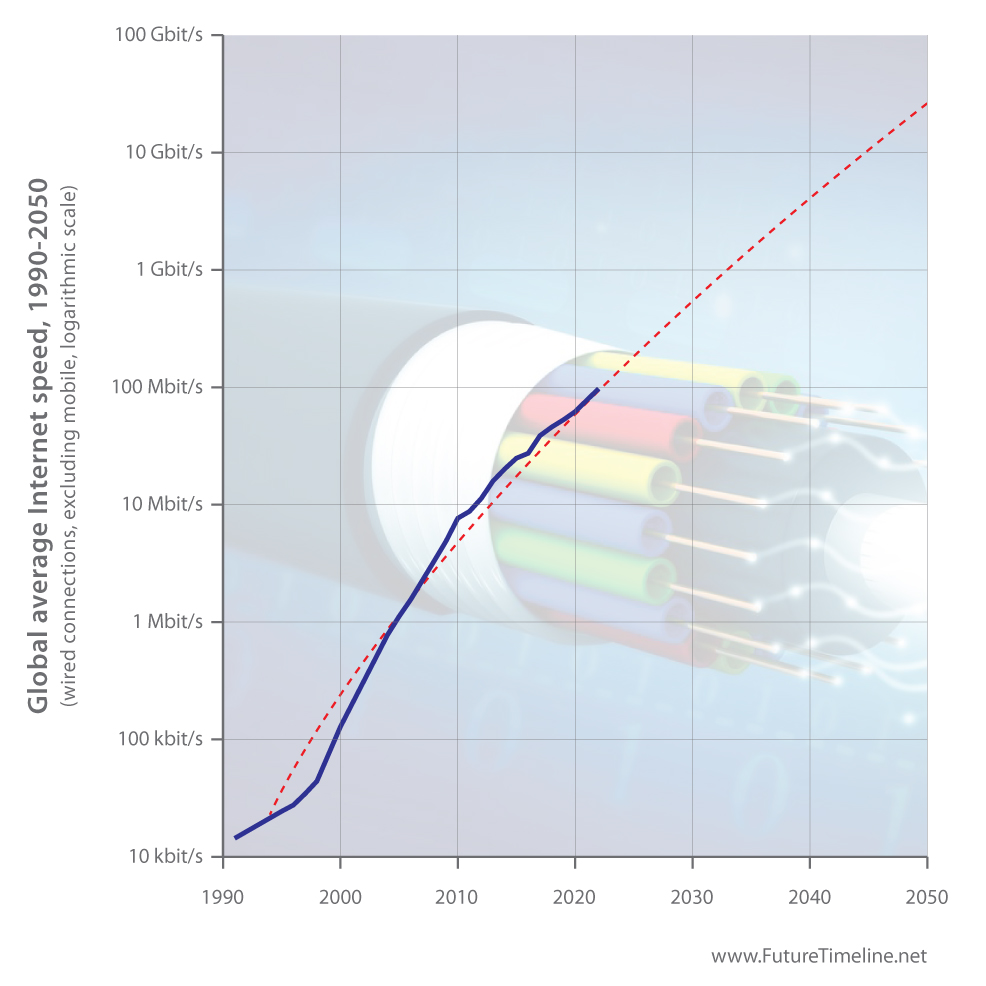
Global average Internet speed, 1990-2050 What will the Internet be like in 2050? This graph shows the global average connection speed from 1990 to the present day, with a future trend projected to 2050.
Global average Internet connection speed, 1990 to the present day (wired connections, excluding mobile, logarithmic scale), with future predicted trend to 2050
In 1991, two years after its invention by Tim Berners-Lee, researchers at CERN in Switzerland released the World Wide Web (WWW) to other institutions and then later that year to the general public. Back then, it had a global average connection speed of just 14.4 kilobits per second (kbit/s). Only a handful of pages could be visited, all with static HTML and limited functionality. However, the World Wide Web grew rapidly, and more than 10,000 websites had been created by 1994, accompanied by the introduction of dynamic features, such as new scripting languages and early search engines. Online shopping began to emerge with the launch of Amazon and eBay, while the release of Windows 95 and the popular Internet Explorer browser prompted many more companies to develop a web presence. Alongside the explosion of content, modem technology quickly advanced – doubling to 28.8 kbit/s and then to 56 kbit/s, breaking what had previously been thought to be an upper limit for phone line transmissions. With the bursting of the dot-com bubble, many businesses either scaled back their web operations, or shut down entirely. But even faster connections emerged, and the global average surpassed 1 megabit per second (Mbit/s) by 2005, around 20 times faster than dial-up services. This became known as broadband and paved the way for new applications such as video streaming. Ongoing, exponential improvements in bandwidth allowed websites to incorporate more and more features and user-generated content, leading to the expansion of social media networks and higher definition video. By the early 2010s, most people had a connection of 10 Mbit/s and by the end of the decade more than half of the world's population had access to the web. The COVID-19 pandemic triggered the mainstream adoption of remote working. Today, a huge gulf exists between the richest, most advanced nations and those with less developed infrastructure. In Singapore, for example, you can expect nearly 300 Mbit/s as standard, while in Turkmenistan the average is just 4.3 Mb/s. As of 2022, the global average is approximately 100 Mbit/s and growing by 20% each year. Internet service providers in more than 50 countries already offer 1 Gbit/s or faster. While expensive for most people today, this is likely to become the global average in the 2030s. Video streaming at 16K and even higher video resolutions will be common. If the trend continues, then the average could exceed 10 Gbit/s in the 2040s and several tens of gigabits by 2050. Early adopters and high-end users in technologically advanced nations will gain access to terabit (Tbit/s) Internet speeds in the coming years. This is 1,000 times faster than 1 Gbit/s and a million times faster than 1 Mbit/s. It would enable the entire contents of a computer hard drive to be transmitted over the Internet in a matter of seconds. This sort of connection has already been demonstrated in laboratory research settings and may be possible for most of the world in the decades beyond 2050.
Sources: "14.4 kilobits per second by 1991." Figure 2: Average internet access speed between 1995 and 2005. "In 2000, the average global residential Internet connection download speed was 127 kilobits per second (Kbps)." 2006 (1.55 Mbit/s). "...3,271 Kbps in 2008, 4882 Kbps in 2009." Article from 2010: "Speeds grew 30% between 2011 and 2012, to 11.3Mbps from 8.7Mbps." "16 Mbps in 2013." "Globally, the average fixed broadband speed grew 22% from 2014 to 2015, from 20.3 Mbps to 24.7 Mbps." 2016 (27.5 Mbit/s). "39 Mbps in 2017." Globally averaged fixed broadband speeds (in Mbps) – 2018 (45.9), 2019 (52.9), 2020 (61.2), 2021 (77.4), 2022 (97.8). 1 terabit per second achieved in optical fibre trial, Future Timeline Blog: Japan sets new Internet speed record: 319 Tbit/s, Future Timeline Blog:
Posted: 25th August 2022. Last updated: 25th August 2022.
If you enjoy our content, please consider sharing it:
|







